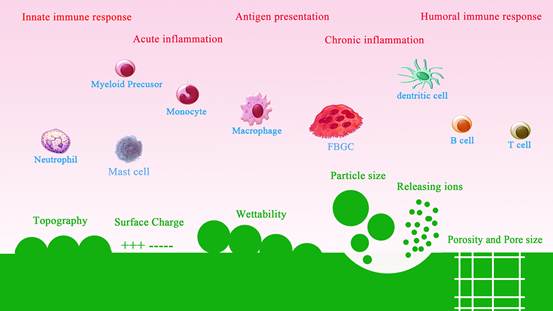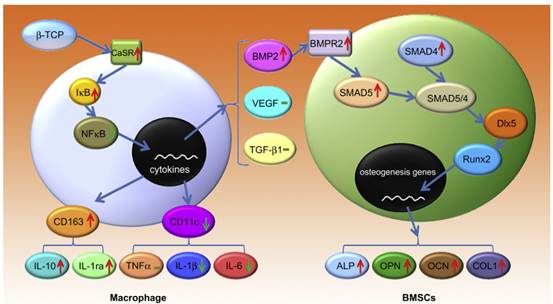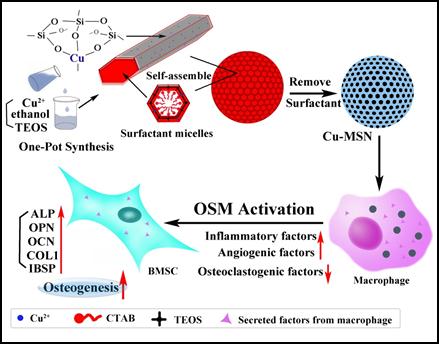Research progress on osteoimmunomodulatory properties of biomaterials at Shanghai Institute of Ceramics
Human body is a systematic organization. Human immune system has significant modulatory effect on the normal functioning and tissue regeneration. However, conventional studies about bone biomaterials ignore the critical issue that how biomaterials regulate immune response in human body which in turn influences the performance of biomaterials in bone formation and reconstruction. To solve this problem, Prof. Chengtie Wu and Prof. Jiang Chang’s research team at Shanghai Institute of Ceramics, Chinese Academy of Sciences, collaborating with Queensland University of Technology, Australia has achieved a series of research progress on osteoimmunomodulatory properties of biomaterials.
Lately, a review article on biomaterials regulating bone construction by modulating human immune reaction from the team has been accepted by journal of “Mater Today” (I.F 14.1). In this review, the authors first described how human immune cells regulate bone construction and destruction and analyzed the multiple functions of immune cells on bone reconstruction process. Then, the authors discussed how the surface micro-structure, hydrophilicity, electric charge, ionic release, particle size and porosity of the bone biomaterials influence the immune reaction and how the osteogenic capacity was further influenced by immune reaction. A new strategy to evaluate the osteoimmunomodulation of bone biomaterials has been proposed in the review (Fig 1).
The research team for the first time proposed the concept of osteoimmunomodulation and established a strategy to evaluate the property of bone biomaterials by combining macrophages and bone marrow mesenchymal stem cells. (Biomaterials 2014;35(5):1507-18) (I.F 8.5) (Fig 2). Then, the team designed a variety of bioactive ceramics with different ionic components. By controlling the release of Cu, Co, Si, Mg ions and the intake of nanoparticles to modulate the inflammatory reactions of immune cells, it was found that the inflammatory reactions of macrophages by active ions and nanoparticles play an important regulatory role in bone formation and resorption. (Biomaterials 2015; 71;35-47,Biomaterials. 2015;61: 126-138,Acta Biomater 2015; In Press). The studies offered important insights on the in vitro evaluation of biomaterials and the mechanism of in vivo bone formation.
The studies were supported by Q-CAS Biotechnology Fund.

Fig 1. The osteoimmunomodulation of biomedical material

Fig 2. A new strategy for bioceramics regulating immune cells inflammation and then modulating the osteogenic differentiation of bone marrow mesenchymal stem cells was proposed.

Fig 3. Copper-doped mesoporous silica nanoparticles were taken in by macrophage,which induced proper inflammatory reactions of macrophages and further promoted the osteogenic differentiation of bone marrow mesenchymal stem cells.



